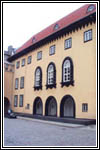 |
Vol 2, No 7
21 February 2000 |
|
|
 T H E A M B E R C O A S T:
T H E A M B E R C O A S T:
Politicking over Paedophilia Mel Huang Political bickering in Latvia hit a new low over the past week when several high-ranking government officials were linked to a paedophilia scandal. The scandal, which has brought out the Latvian media's strongest tendencies toward yellow journalism and gripped the politicians' most spiteful attention, exploded on 17 February to the shock of political observers. The repercussions of an announcement made that morning in the Saeima will haunt Latvian politics for years to come.
Angry reactions The reaction from politicians, especially the three named individuals, was naturally harsh. Prime Minister ≈݃∑ƒìle called it an "elaborate provocation" against the state. Head of the State Revenue Service Andrejs Sonƒçiks stated he would file legal action against ƒÄdamsons for slander, saying, "In the old days, a person would have been challenged to a duel and stabbed to death for such defamatory accusations." Sonƒçiks also charged that Latvian politics had stooped to a new low, saying ƒÄdamsons's statement "indicates that politics in Latvia becomes dirtier every day and increasingly disgusting means are used to protect one's interests."
Members of the ad hoc commission generally voiced displeasure over the statement by Ādamsons. MP Gundars Bērziņš of the People's Party said: "Ādamsons, you belong in a political dung heap!" The Office of the Prosecutor General said there is no evidence against any of the three men named by Ādamsons, and according to the National Human Rights Office, by his action, Ādamsons in fact violated the constitutional and human rights of the three individuals. True motives? Ādamsons's announcement ends months of speculation and rumour-mongering in the media and within political circles since the issue was introduced on the popular television programme Nedeļa (The Week), produced by MP Edvīns Inkēns of Latvia's Way. The naming of Birkavs, who is a founding member of Latvia's Way, indicates that the runaway train, led by Ādamsons, is now out of the party's control - despite it having originally publicised the entire scandal.
ƒÄdamsons, despite all the harsh response to his action, appears to be standing his ground. He told the press: "I fear nothing in this life." Some watchers are also wondering if the entire exercise has been an "outing" operation by ƒÄdamsons, who has said: "I would never have believed that such high-ranking officials are linked to the paedophilia matter and that this gay brotherhood has such a great and deep influence in this country." This came two weeks after a disgruntled Social Democrat MP accused Prime Minister ≈݃∑ƒìle's People's Party of supporting the spread of homosexuality. Then there is the whole issue of opening KGB files, of which ƒÄdamsons is wary, as he has been named as a former KGB operative many times.
The forgotten victims In the end, the innocent party here remains the abused children of Latvia. MP Aida Prēdele expressed disappointment following Ādamsons's statements, saying that the real problem has now been hidden "in the shadow of this show we see staged here." There have been arrests made throughout the growing scandal, which authorities have linked to the beauty pageant business. However, the innuendo and rumours floating within political circles have hijacked this issue and have pushed the real problem to the side. The media have sidelined the very serious questions concerning child abuse and sex tourism as well, opting to cover the sensationalistic parts of the entire business. In many ways the unfolding of this scandal is an indictment of Latvia's press for its failure to cover the serious issues and retain its journalistic integrity. How this scandal will play out in Latvian politics is anyone's guess. The competing factions are fractious, and the loathing is genuine. The problems, in many ways, have become very personal ones among politicians. However, this scandal could also possibly damage Latvia's international image - as much as the recent case of Konrāds Kalējs [see Amber Coast from 10 January]. The mere headline suggesting the justice minister of a country went on a hunger strike over such allegations cannot do much for a country already short on positive international PR. Mel Huang, 18 February 2000 For more on the Latvian media's coverage of the paedophilia scandal see Steven C Johnson's article from 4 October 1999. Archive of Mel Huang's Amber Coast articles
|
|
![]()
Copyright © 2000 - Central Europe Review and Internet servis, a.s.
All Rights Reserved



